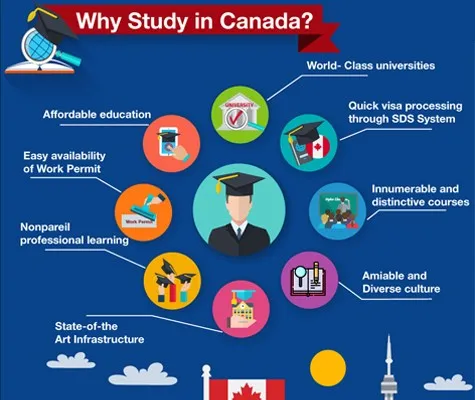December 27, 2023
Why Is Ontario, Canada a Great Destination for International Students to Experience a World-Class Education?
by Arunachalam

Although Canada has several different provinces, Ontario is renowned for providing economic stability and a wide variety of institutions. Almost 40% of the population resides in Ontario, making it the most popular area of the nation among foreign students due to the abundance of promising employment prospects. The Great Lakes and numerous main US cities, including Detroit, are also on its borders. There are several prestigious universities and public colleges in the province. Additionally, the Ontario labour market provides educated students with a choice of career alternatives to realise their aspirations. Read on to find out more about Ontario.
The below image describes why you should pick Canada as your study destination.

Courtesy: www.milestonegrs.com
Table of contents
1. Why should you study in Ontario?
- Education standard
- Canada's financial and economic hub
- Technological hub
- A society that is welcoming, safe, and diverse
2. Ontario's educational system
3. Ontario's top universities for international students to study in
- Toronto Metropolitan University
- Waterloo University
- Ottawa University
4. Options for international students' accommodation
- On campus housing facilities
- Off-campus housing facilities
- Homestay
- Temporary housing option
- Student housing
- Rental properties or personal leases
5. Conclusion
1. Why should you study in Ontario?
If Ontario is on your mind, the following significant features will provide you with more information about the province:
a. Education standard
Ontario has a combination of universities that are large, medium, and small. There is no compromise with the quality of education and the degree is recognised globally. Some universities are listed below:
Small universities: Nipissing University
Medium universities: Queen’s University
Large universities: Western University and the University of Toronto
Toronto Metropolitan University in Toronto, University of Waterloo in Waterloo and University of Ottawa in Ottawa are some of the top universities in Ontario.
b. Canada's financial and economic hub
While Ottawa is the nation's capital, the multi-ethnic metropolis of “Toronto” is also the continent's second-largest financial hub and one of the most popular places for aspirants to study. The majority of Canada's largest employers are found in just these two markets.
c. Technological hub
This demonstrates how important manufacturing is to Ontario's economy. Internationally talented students flock to Ontario's “Technology Triangle,” which is made up of the cities of Ottawa, Toronto, and Waterloo.
d. A society that is welcoming, safe, and diverse
Ontario is renowned for its welcoming hospitality and cultural diversity. The province has a wealth of expertise hosting foreign students, and it provides adaptable laws and practices to improve student safety not only on campus but also in homestays and the surrounding neighbourhood.
Here is some information about Ontario in a nutshell.
Population: 14,305,073
Capital: Toronto
Largest City: Toronto
Cost of Living: $4,975/ per month
Weather: The four seasons in Ontario are spring, summer, autumn (autumn), and winter. The coldest month of the year is typically January, and the warmest month is July.
2. Ontario's educational system
The Ministry of Training, Colleges, and Universities' main focus in Ontario is postsecondary education. The most recent graduate programmes are evaluated by the Ontario Council on Graduate Studies, which is made up of university deans of graduate studies, before being examined by the ministry.
In Ontario, there are 24 publicly assisted colleges of applied arts and technology, one applied health science institute, 19 publicly assisted and affiliate institutions, and 17 privately funded institutions with limited degree-granting jurisdiction.
With the approval of the Minister of Training, Colleges and Universities, a number of private and out-of-province public universities provide specific degree programmes in Ontario.
The university offers distance learning and part-time degree programmes in the sciences, the arts, graduate studies, and professional fields.
Funding for more than 3,000 college programmes has been authorised. Despite the fact that these programmes vary according to the province's many areas, 200 provincial programmes remain consistent in terms of delivering programme learning outcomes, and each college has a recognised area of specialisation.
The below image lists out the vocational course for international students in Canada.

Source: www.gyandhan.com
3. Ontario's top universities for international students to study in
a. Toronto Metropolitan University
Due to its location in Toronto, one of the most diverse cities in the world, the university has an impact both locally and globally. Additionally, the institution engages in scholarly, research, and creative (SRC) activities to solve problems in the real world to enhance living standards and promote economic growth.
b. Waterloo University
During the Fall of 2020, the University of Waterloo had 42,000 students enrolled in undergraduate and graduate programmes (including full- and part-time). Additionally, in 2020, it awarded almost 9,000 degrees.
c. Ottawa University
The largest bilingual (English and French) university in the world is located in Ottawa, the nation's capital. Additionally, its humanities, social sciences, engineering, health, and sciences are extremely well known.
4. Options for international students' accommodation
Finding a place to live in British Columbia is the next step you should take after choosing where you will study. There are a lot of choices available. Every housing option, either living on campus or in a private apartment, has its own policy.
a. On campus housing facilities
Residence halls or townhouses/apartments are the types of lodging available on or close to campus. As you will be close to your classroom and receive the convenience of studying in the classroom, staying on campus is certainly simpler than looking for off-campus lodging. You get to socialise and establish more ties with other students.
b. Off-campus housing facilities
You might search for private, off-campus accommodation to reduce your living expenses. For a list of neighbouring rental properties, try asking at the campus office of your student union. Keep in mind that your colleges do not inspect these lodgings, therefore it is your job to speak with the landlord and examine the space. Additionally, remember to take into account the following factors when choosing off-campus housing: the distance of the flat from your university, the monthly rent, the availability of transportation, and the roommates.
c. Homestay
Some universities give students the choice to stay with a Canadian family at their house, which includes furnished individual and shared rooms. You get a full cultural experience and a home away from home with this kind of setup. Students under the age of 18 who are new to Canada are typically given this choice.
d. Temporary housing option
If you haven't located a place to live before receiving approval, you can temporarily book housing in Canada. If they have a deal with your college, hotels close to campus locations are accessible at a subsidised rate.
e. Student housing
The sole difference between off-campus student housing and on-campus housing alternatives is who is in charge of running them—these are run by cooperatives or private businesses rather than a college or institution. Nevertheless, only students have access to both, and the only place to get the information is on campus.
f. Rental properties or personal leases
This is the most typical kind of off-campus accommodation, and in Ontario, rental agreements for it last for a full year. Keep in mind that most rental properties in Ontario are unfurnished. However, landlords most often give students basic furnishings.
5. Conclusion
In fact, Ontario is the most populous province in Canada and has the widest range of educational institutions, including 20 universities, 26 colleges, and 150 apprenticeship trades. It is the most culturally diverse province and welcomes guests from all over the world with open arms.
Please feel free to contact our international education experts at MWT Education Consultancy for further information on universities, colleges and other details you may require.

Written by
Arunachalam
ENQUIRE NOW
April 03, 2024
Best Public Universities in Australia for Indian Students
Get a simple guide for Indian students on applying to Australian public universities.
April 03, 2024
Your Key to Study Abroad: Mastering Your Visa SOP Made Easy
Learn easy tips for writing your Visa Statement of Purpose (SOP) that get you closer to your dream education abroad.
April 03, 2024
Why Nurse Shortages Matter: Impact on Patients in Australia
Find out how not having enough nurses affects patient care in Australia's hospitals and clinics.
April 02, 2024
What Makes a Good Paediatric Nurse in Australia
Discover what makes Australian paediatric nurses exceptional: calmness, empathy, and dedication to children's well-being.
April 02, 2024
Beat Nurse Burnout: Tips for Nurses in Australia
Discover practical advice for nursing students and professionals in Australia to navigate the challenges of burnout.
April 02, 2024
The Tireless Work of Australian Nurses: A Closer Look
Explore the incredible dedication of Australian nurses, who work tirelessly day and night to keep us healthy and safe.
March 26, 2024
Making the Most of Nursing Internships
Learn about the benefits of nursing internships, like gaining confidence and building connections.
March 26, 2024
Discover Mental Health Nursing Careers in the UK
Find out why mental health nursing jobs in the UK offer stability and fulfilling work helping people in need.
March 26, 2024
The Crucial Role of Health Literacy in Nursing Practice
Uncover nurses' strategies to enhance patient care and communication skills through improved health literacy.
March 18, 2024
How Technology Helps Nurses: A Simple Guide
Discover how technology accelerates nurse learning by granting swift access to vital information for skill acquisition.
